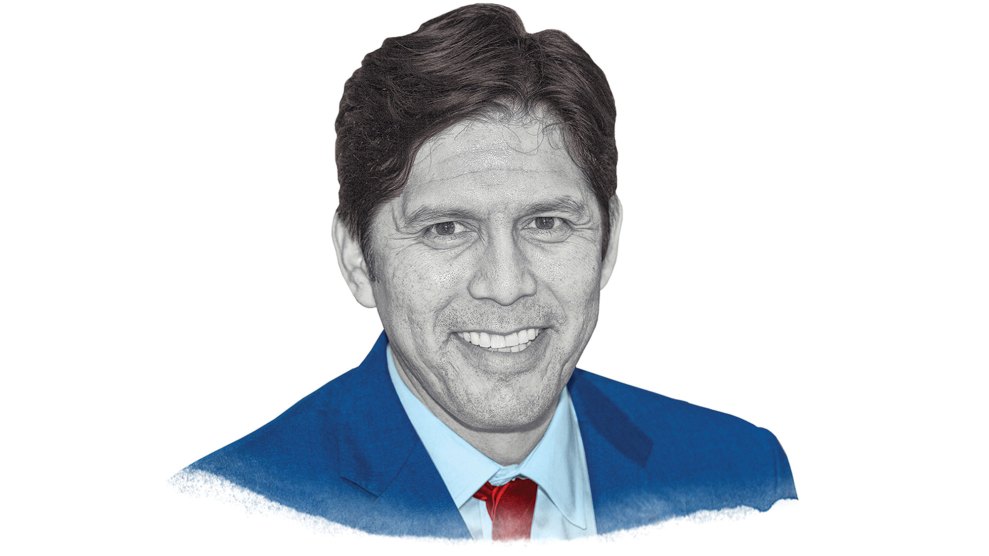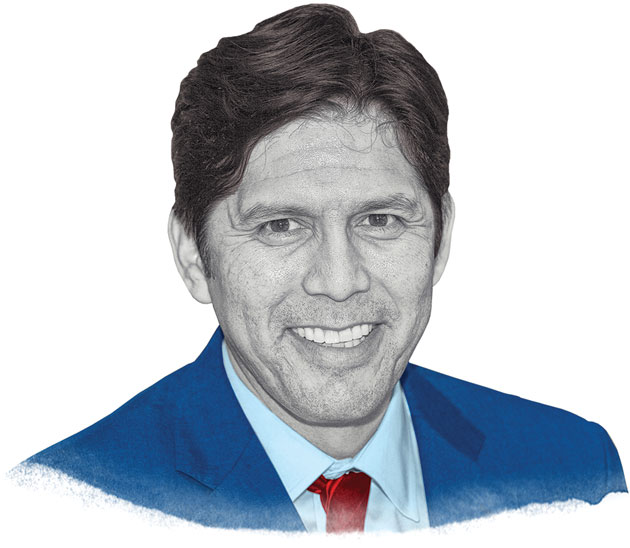
Gluekit; Damian Dovarganes/AP
Kevin de Leon Gluekit; Damian Dovarganes / AP
Editor’s note: On October 15, de León announced he will run for US Senate in 2018, for the seat held by five-term incumbent Dianne Feinstein.
Kevin de León figured he would get crushed in his first election. Egged on by his friends into running for an open seat in the California State Assembly in 2006, he faced off against the granddaughter of labor icon César Chávez in a heavily Latino Central Los Angeles district. “No question about it,” he says, laughing from the passenger seat of a big black SUV weaving through brutal San Francisco rush-hour traffic. “I used to pray, ‘Lord, when I lose, just make it respectable.'”
To his surprise, de León won the race decisively, setting in motion a chain of events that, a decade later, has made him the state’s top legislator and its most powerful Latino politician. Today, the 50-year-old president pro tempore of the California State Senate is squarely in the driver’s seat of the West Coast’s resistance to the Trump administration. “The overall strategy is very simple and straightforward,” he says, as we make our way to the airport. (He was in town to give the keynote address at a conference on climate change.) “It is to protect our economic prosperity, our progressive values, and our people.”
He’s hired former Attorney General Eric Holder and Holder’s law firm to handle the inevitable showdown between Donald Trump and the Democratic-controlled Legislature of what the president has called “out of control” California. While he believes that efforts to establish “sanctuary cities” are largely symbolic, he has authored legislation that would prohibit state and local law enforcement agencies from cooperating with federal immigration authorities, and would require schools to limit their assistance to immigration agents. Basically, he’s building a legal wall between California and Trump.
While much of America is freaking out over the new normal, de León feels like he’s been here before. As an activist in his late 20s, he organized protests against Proposition 187, a 1994 ballot measure that would have barred undocumented immigrants from public services like hospitals and schools. The proposition, fiercely endorsed by then-Republican Gov. Pete Wilson, passed by a large majority, but a federal judge blocked parts of the law and it was never implemented. (De León wrote a 2014 bill that ultimately gutted the proposition.) If that all sounds familiar, consider: The GOP’s embrace of Proposition 187 drove a wedge between the party and the state’s growing Latino population and is one reason Democrats now control the governor’s mansion and have a supermajority in both houses of the Legislature. “The country is experiencing what California went through 22 years ago,” de León says. “I can tell you, it doesn’t turn out well for the Republicans, or for extremist forces.”
“You get politicians who”—he sniffs—”smell economic anxiety and fear and panic,” de León says. “They take advantage of that fear and pit one group against another. They say, ‘You are in your situation because of them, because they look different, they sound different, and they act different.'”
De León spent his early years acutely aware of those differences. Born to a Guatemalan mother, he remembers riding the bus with her as she commuted from the basement where they lived to the opulent San Diego homes she cleaned. When de León commented earlier this year that “half of my family would be eligible for deportation” if Trump’s immigration orders had been in effect decades ago, right-wing media denounced his family as criminals.
He got into the University of California-Santa Barbara in the late 1980s but was soon kicked out for poor academic performance. (He later graduated from Pitzer College.) In need of a job, de León took to teaching English as a Second Language, civics, and history courses to adult immigrants trying for citizenship. As Proposition 187 surfaced, de León got into political organizing and became known as a rising voice on immigration and education.
Two terms in the State Assembly followed, culminating with de León’s election to the California State Senate in 2010. In 2014, his colleagues elected him president pro tempore.
De León’s political victories exist in almost perfect opposition to the Trump agenda. He wrote California’s ambitious Clean Energy and Pollution Reduction Act, which stipulates that the state must get at least half its electricity from renewable sources by 2030. He also played a major role in passing a 2013 law that let undocumented immigrants get driver’s licenses and another that will bump the state minimum wage to $15 by 2023. “I don’t like to move abstract theoretical policies that, on a white paper, sound good. If I wanted to do that, I’d be a professor,” he says. “I believe strongly that when you have political capital, you should use it in a manner that helps improve the human condition. You shouldn’t just compile power and hold onto power for power’s sake.”
Term limits will force him to leave his current seat in 2018. Some have suggested that he join the already crowded field of contenders to be the Golden State’s next governor. As we pull up outside Terminal 1, I ask de León what he’ll do next. “Once I decide,” he says before bounding out of the car, “I’ll let you know.”














